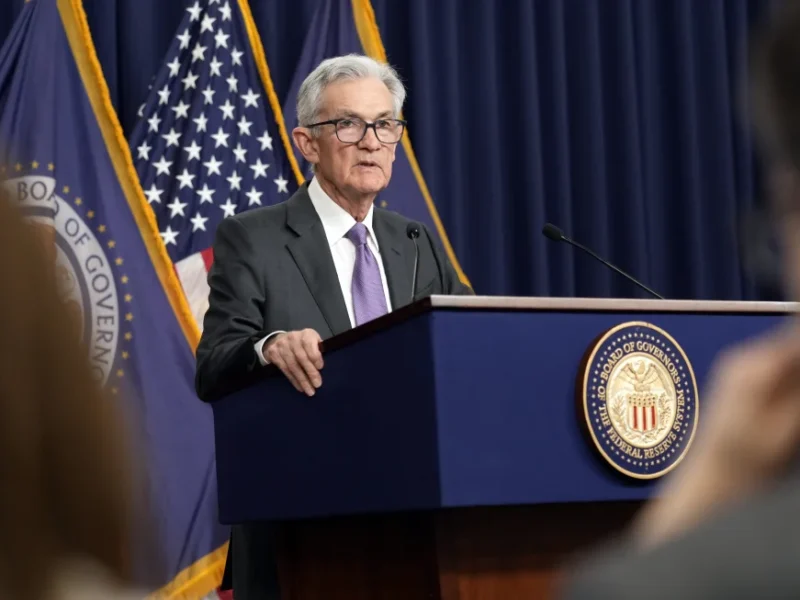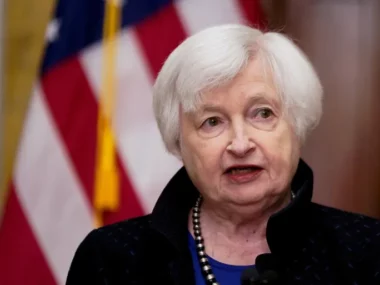America’s central bank doesn’t foresee any signs of a recession looming in the near future—neither this year nor the following year.
The Federal Reserve’s committee of 19 policymakers recently released updated economic projections, indicating even stronger economic growth for 2024, 2025, and 2026 than previously anticipated.
This optimistic outlook is echoed by analysts, including Goldman Sachs’ chief economist, who suggest that the severe economic hardships associated with a recession, such as widespread job losses and subdued consumer spending, are unlikely to materialize anytime soon. Fed Chair Jerome Powell emphasized the strength of the economy, the robust labor market, and the significant decrease in inflation during a recent statement.
Corporate profits have remained strong, the stock market continues to achieve record highs, and there are indications of a potential productivity surge in the United States that could fuel growth without igniting inflation concerns.
Despite interest rates reaching their highest levels in two decades, the economy has demonstrated remarkable resilience, which economists believe could persist in the years ahead.
While Fed officials anticipate three interest rate hikes this year, the era of ultra-low interest rates is over. However, economists argue that this won’t pose a problem for the resilient US economy.
Mike Skordeles, head of US economics at Truist Advisory Services, described the economic outlook as “stronger-for-longer” rather than “higher-for-longer,” emphasizing the positive trajectory of the US economy.
US GDP expanded by a robust 3.2% annualized rate in the fourth quarter, following a strong 4.9% rate in the previous quarter. Job growth, a key driver of economic expansion, remains solid, with unemployment remaining low and payroll growth continuing at a healthy pace.
While the economic outlook appears optimistic, any unforeseen economic shock could disrupt growth and trigger a downturn. One potential risk is if inflation remains stubbornly high, leading the Fed to adopt more aggressive measures to curb inflation, which could inadvertently slow down economic growth and potentially lead to a recession.
Overall, while the recession risk has diminished, there remains uncertainty, particularly regarding unexpected developments in inflation data, which could impact the Fed’s policy decisions and ultimately affect economic growth.
Reddit’s stock experiences a significant increase on its first day as a publicly traded company.
Reddit, an original social media entity, has finally commenced trading on the New York Stock Exchange, over a decade after many of its counterparts, according to reporting by Clare Duffy.
Under the ticker symbol “RDDT,” shares began trading at $47 and surged to a high of $57.80 early on Thursday afternoon, representing a remarkable 70% increase from its initial public offering price of $34. At its peak, the stock’s market capitalization reached approximately $10.9 billion.
This milestone is significant for the nearly two-decade-old Reddit, a development the company has been preparing for since at least 2021, evidenced by the hiring of its first chief financial officer. Reddit’s public debut also marks the first for a social media company in years, potentially serving as a benchmark for other firms contemplating initial public offerings.
However, Reddit experienced a downward adjustment on its second day of trading, with shares declining by approximately 8.5% after surging 48% following its NYSE debut.
Next in line
Here’s what’s coming up next:
Monday:
- The Chicago Fed will publish its National Activity Index for February.
- The US Commerce Department will release February data on sales of new single-family homes.
- Fed Governor Lisa Cook will deliver remarks.
Tuesday:
- Earnings reports are expected from McCormick and GameStop.
- The US Commerce Department will unveil February figures on new orders for durable goods.
- S&P Global will release its S&P CoreLogic Case-Shiller National Home Price Index for January.
- The Conference Board will publish its consumer survey results for March.
Wednesday:
- Fed Governor Christopher Waller is scheduled to deliver remarks.
Thursday:
- Earnings announcements are anticipated from Walgreens Boots Alliance.
- The US Commerce Department will issue its final estimate of fourth-quarter gross domestic product.
- The US Labor Department will report the number of new applications for unemployment benefits in the week ended March 23.
- The University of Michigan will release its final reading of consumer sentiment for March.
- The National Association of Realtors will report February home sales based on contract signings.
Friday:
- US markets will be closed in observance of Good Friday.
- The US Commerce Department will release February data on household spending, income, and the Fed’s preferred inflation gauge.
- Fed Chair Jerome Powell is scheduled to deliver remarks.











